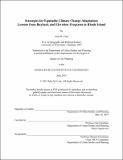| dc.contributor.advisor | Karl Seidman. | en_US |
| dc.contributor.author | Curti, Julie M. (Julie Marie) | en_US |
| dc.contributor.other | Massachusetts Institute of Technology. Department of Urban Studies and Planning. | en_US |
| dc.coverage.spatial | n-us-ri | en_US |
| dc.date.accessioned | 2015-09-29T18:09:20Z | |
| dc.date.available | 2015-09-29T18:09:20Z | |
| dc.date.copyright | 2015 | en_US |
| dc.date.issued | 2015 | en_US |
| dc.identifier.uri | http://hdl.handle.net/1721.1/98928 | |
| dc.description | Thesis: M.C.P., Massachusetts Institute of Technology, Department of Urban Studies and Planning, 2015. | en_US |
| dc.description | This electronic version was submitted by the student author. The certified thesis is available in the Institute Archives and Special Collections. | en_US |
| dc.description | Cataloged from student-submitted PDF version of thesis. | en_US |
| dc.description | Includes bibliographical references (pages 114-119). | en_US |
| dc.description.abstract | As the impacts of climate change become more pronounced, many coastal and riverine communities in the United States will face severe flooding from sea level rise and increased frequency of storms. From a municipal perspective, planners and elected officials will be confronted with questions of what tools and resources are available to help private property owners adapt to climate change impacts, when those tools and resources should be used, and who they should help. This thesis uses qualitative methods to examine how two communities in Rhode Island, Cranston and Westerly, have utilized buyback and elevation programs to adapt to future flooding risks. My questions include understanding how federal policies for acquisitions and elevations shape adaptation at the local level, how planners prioritize and fund these projects, how different aspects of equity are incorporated into municipal-level decisions, and how adaptation local-level efforts with private property owners should be pursued moving forward. In my findings, I identify a merging of hazard mitigation activities with climate change adaptation, with existing federal disaster mitigation programs administered by the Federal Emergency Management Agency and the Department of Housing and Urban Development shaping and constraining adaptation efforts in Cranston and Westerly. Limited levels of federal funding impacts what municipalities will do, leads to incremental adaptation planning efforts, and means that communities need to act quickly to implement programs when funding becomes available after disasters strike. I find that Westerly and Cranston have prioritized the use of buyback and elevation programs based on spatial-environmental risk, but neither community has defined local-level standards for determining climate change risks, nor defined local level standards for incorporating socio-economic equity into their programs. I argue for an approach to adaptation planning that balances justice-oriented distributional and procedural equity at the local-level, and suggest supportive changes at the state and federal level that would facilitate stronger adaptation planning at the local level. In anticipation of increasing demand for help from private property owners in the future, communities should define clear equity standards to ensure that vulnerable populations can adapt and use public participation to help define municipal-level priorities for adaptation. | en_US |
| dc.description.statementofresponsibility | by Julie M. Curti. | en_US |
| dc.format.extent | 119 pages | en_US |
| dc.language.iso | eng | en_US |
| dc.publisher | Massachusetts Institute of Technology | en_US |
| dc.rights | M.I.T. theses are protected by copyright. They may be viewed from this source for any purpose, but reproduction or distribution in any format is prohibited without written permission. See provided URL for inquiries about permission. | en_US |
| dc.rights.uri | http://dspace.mit.edu/handle/1721.1/7582 | en_US |
| dc.subject | Urban Studies and Planning. | en_US |
| dc.title | Strategies for equitable climate change adaptation : lessons from buyback and elevation programs in Rhode Island | en_US |
| dc.type | Thesis | en_US |
| dc.description.degree | M.C.P. | en_US |
| dc.contributor.department | Massachusetts Institute of Technology. Department of Urban Studies and Planning | |
| dc.identifier.oclc | 921883296 | en_US |
